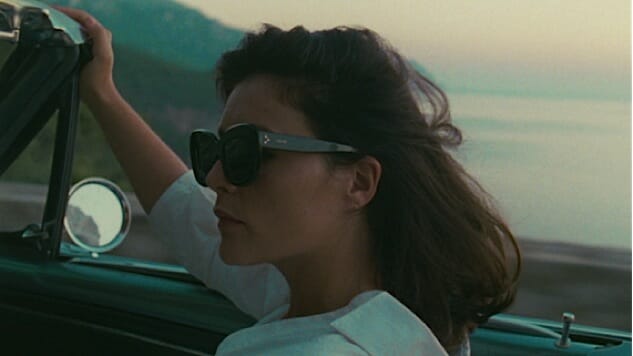Jessie Ware’s Glasshouse Is Stronger Than Ever
It took a life-changing event to re-inspire the British singer on her third album.
Image: Tom Beard Music Features Jessie Ware
Like Mike Myers’s bumbling cinematic spy Austin Powers, there was a recent period when the British chanteuse Jessie Ware believed that she’d actually lost her mojo. So much so that her producer, Benny Blanco, after scanning the early tracks she’d composed in Sweden and Los Angeles for her new third album, Glasshouse, had to sit his protégé down and tell her that he just didn’t hear the magic that had rippled through her Mercury-Prize-nominated 2012 debut, Devotion. She wasn’t even offended. “I think I secretly knew it, all along,” she sighs, in 20/20 hindsight.
“I kept trying to persuade Benny that these songs were really good, but I don’t think I really believed it,” says Ware, 33. “I was just impatient to get the record done.” She was a bit distracted at the time, being pregnant with her first child, a daughter born a year ago this September. She tried to wing it, but Blanco called her on it. “He just said, ‘You’ve lost yourself. And you really need to find yourself again, because you were quite good before. And I trust him and really care what he thinks, so it felt really good to hear from him like that. Because then I made the decision to go back into the studio and not overthink it, not worry about what I think everyone else wants, and just be creative.”
“I was trying to write a hit, but I actually don’t know what a hit is, because I’ve never really had one. And that’s ridiculous. That’s not why people listen to me.”
“Write what you know” became the mantra, and she began to find inspiration in the process of motherhood. The first day she returned to recording, she composed the diary-honest, swaying R&B anthem “First Time,” and the floodgates opened. The song, which touches on her marriage to childhood sweetheart Sam Burrows and the stress a couple can endure when a baby arrives, lit the same spark she first felt with Devotion, after she’d boldly waived a budding career in journalism to try singing behind Jack Penate, SBTRKT, DJ Joker, and even Florence Welch on her 2011 album Ceremonials. Almost overnight, she got her mojo back. Or, as she puts it, “After experiencing this, ahem, slight hindrance, it was suddenly a pleasure to be in the studio again.”
What Ware and Blanco arrived at with Glasshouse is a reflective, no-holds-barred confessional that, through careful song sequencing, unwinds the saga of parenthood and all of its attendant pleasures and pitfalls. It opens with soulful stomper “Midnight,” which crackles with unbridled lust and could easily refer to the passionate night of her daughter’s conception. Then it perambulates through the enormity of new responsibility (a waltzing “Thinking About You,” the bluesy “Stay Awake, Wait for Me”), the self-doubt that entails (a finger-popping “Alone,” the hesitant, jiggling ballad “Selfish Love”), and eventually newfound sense of purpose and determination (monolithic pop ballads “Finish What We Started” and “Last of the True Believers”). The album closes on a trumpet-punctuated acoustic strummer called “Sam,” a spousal ode co-written by her longtime collaborator, Ed Sheeran, that offers the kind of heartfelt revelation you rarely find in prefab, IKEA-constructed pop.
Flashback: Jessie Ware: The Best of What’s Next
Too much construction was what led Ware into her first-ever dead end, trying to follow the success of both Devotion and its Brit-Award-nominated 2014 followup, Tough Love. “I was trying to write a hit, but I actually don’t know what a hit is, because I’ve never really had one,” she says, content with her popular profile as an album artist. “And that’s ridiculous. That’s not why people listen to me. But when I stepped away from that, I just started writing better songs, songs like ‘Alone,’ which just felt entirely natural. Or ‘Hearts,’ which is about my family—my sister and my mom. I mean, these are real songs. I dug deep, and I wasn’t ready to do that before. I was scared that nobody cared, and that I didn’t have a good enough story to tell.”
Now, Ware is positively brimming with stories. She doesn’t want to share her daughter’s name, but everything else is fair game, like the baby’s first birthday party, which included several classmates from her London daycare, and the man who runs the establishment himself, Mr. Frog Prince. As a one-man band, he entertained the toddlers with everything from “Old McDonald” to “Smells Like Teen Spirit.” “And as far as I’m concerned, he’s king,” mom praises. Her daughter will also be accompanying Ware on a Stateside tour next month, with Burrows in tow as well. “So we’ve been looking at the tour buses that are available, because it wouldn’t be very fair to my baby on the bus with the whole entourage,” she says. “So I have to get my own tour bus, which feels very extravagant, but also really cool, like we’re going on this road trip across America, then Europe.”
Ultimately,Glasshouse whose title represents the delicateness of family of life, as well as Ware’s new unadulterated lyrical depiction of it, feels to its composer like a journey, like she’s run some sort of emotional gauntlet and emerged, happy and intact, on the other side. And she wants fans to really listen to what she’s singing, which is why at shows she now requests that cellphone cameras be switched off during her hear-a-pin-drop nightly rendition of “Sam.” “I’ve filmed favorite parts of a song in concert myself,” she admits. “And I understand it—you’re proud to be there. You’re excited, and you want to show off to everyone that you’re at this gig, and it’s the best thing ever. But I just want to see all those hands in the air, for the whole show.”